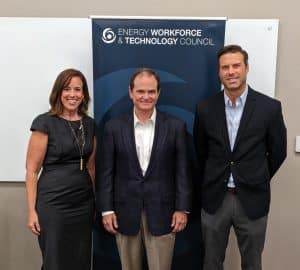
Energy Workforce COO Molly Determan, Marshall Dodson, Key Energy Services, Brandon Janda, GD Energy Products
Having empathy as a leader is understanding how your decisions will be thought about and felt by others in the organization, advised Energy Workforce Board Member Marshall Dodson, President & CEO, Key Energy Servicers, to audience members during a leadership forum on August 18.
The forum, sponsored by the Emerging Executives Committee, was moderated by committee member Brandon Janda, GD Energy Products, and sponsored by Strategic Partners Chevron and Schlumberger.
When listening to your employees, ask their opinions, Dodson said, creating situations where they feel respected and their opinion matters. That, in turn, increases their engagement into the company’s goals and objectives.
“Everybody in a company has a role to play that contributes to success. I don’t view my job as more important to a forehand’s job. We serve different roles to play different skills.” Marshall Dodson, President & CEO, Key Energy Services
Dodson said leadership is not a job — it is a quality and a skill that we all develop at different points in our lives and careers. And treating your employees and team members with respect is foundational for building trust.
“Trust is foundational for the inclusion of different ideas, different backgrounds, different opinions,” Dodson said. “And I think that inclusion of different backgrounds, ideas, perspective, is ultimately what’s going to make our company better.”
By practicing empathy when talking with employees, customers and the community, leaders can go a long way towards finding what needs to be fixed in an organization.
“We’re having to rethink how we work. How do we accommodate someone who doesn’t want to work a 65-hour work week? How do we accommodate someone who doesn’t want to be told on Friday that they are working Saturday and Sunday? We’re listening, but we’ll have to shift our entire industry.” Marshall Dodson
Dodson spoke about the importance of active, engaged listening and how it impacts many areas of leadership. How things are perceived from others perspectives is a critical component of listening, Dodson said, so that you, as a leader, can understand and be an effective influencer of decisions. “Listening is asking, it’s engaged, it’s participation,” he said.
“I don’t believe that listening and understanding others perspectives is indecisive or shows weakness,” he said. “To me, it shows strength, it shows strength in your role. It’s inclusive, and it allows for better decisions.”
Read article here
